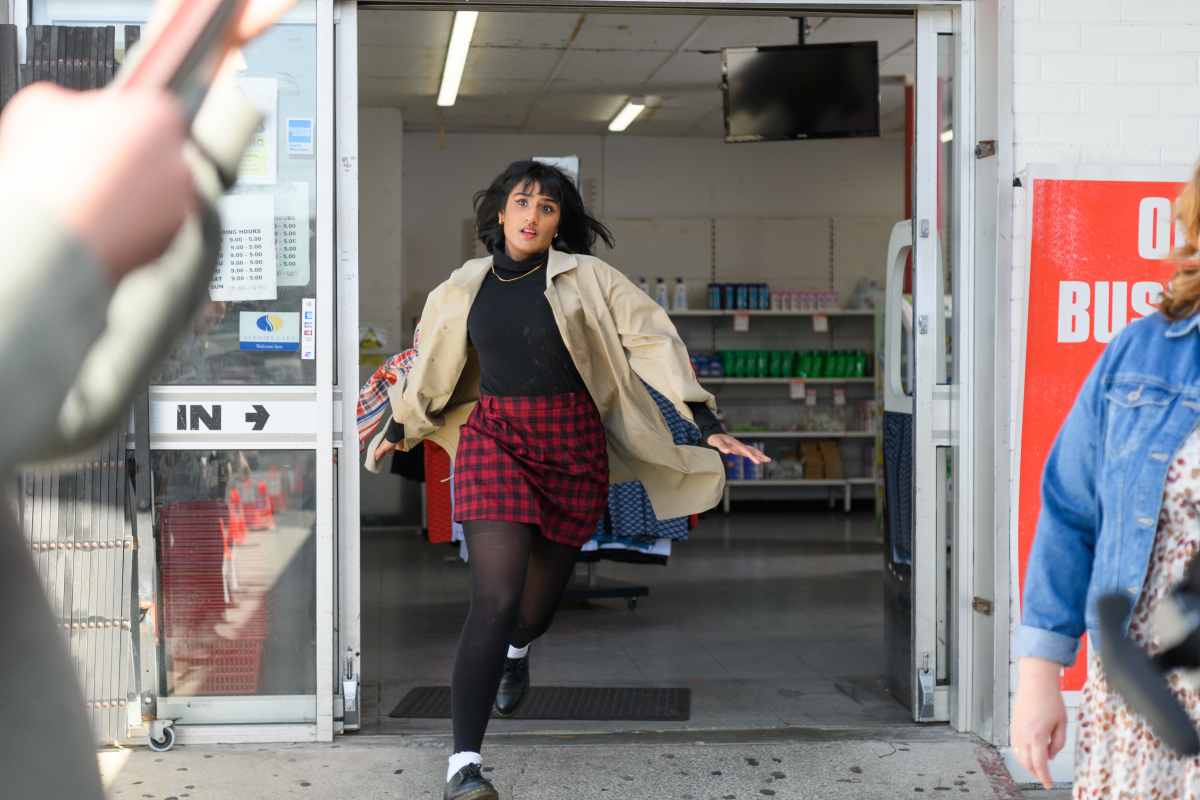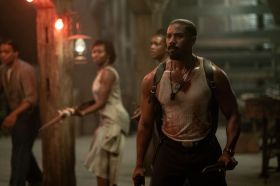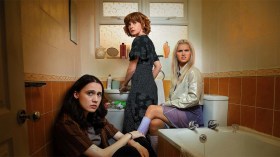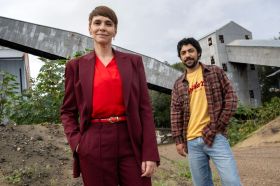Ruby Rai is a Private Investigator with little to investigate – privately or otherwise. But when a string of robberies involving expensive monstera houseplants arise, she’s forced to get back into the game, one inane suspect at a time.
This is the premise of a comedy series (Ruby Rai PI) pitched to the ABC under their Fresh Blood initiative, which invites emerging screen creatives to plan and produce short shows that may get picked up for full commissions with the network. It’s only been running for a couple of years, and Melbourne-based screenwriter Vidya Rajan is one of the lucky ones getting to develop and pitch her original ideas this time.
Before boarding the Fresh Blood initiative in 2023, Rajan wrote for and contributed to the ABC comedy series Why Are You Like This, SBS’s The Feed and ABC’s At Home Alone Together. She’s also helmed stageplays, interactive comedy experiences, videogames, and has starred in Aunty Donna’s Coffee Cafe.
The very busy and very funny Rajan spoke to Silvi Vann-Wall about pitching big ideas to the ABC, writing comedy, and watching sitcoms for inspiration.
Hi Vidya! I loved the episodes of Ruby Rai PI that are already out on YouTube. Did it freak you out that, after they went live, there was a real life monstera robbery on the news?
Vidya Rajan: Yeah! Someone tagged me on Insta in the Channel 7 news report about the plant thief like a week after the eps dropped. It felt very surreal. The reason behind us using a ‘monstera murderer’ as our central mystery was the fact that it’s the lowest-stakes crime we could think of. We thought it was the silliest thing that could happen, and that it would never happen in real life. But it turns out there is a whole black market for plant reselling, so these robberies happen quite a lot!
There were even some comments left on the news article that sounded exactly like the boomer characters we wrote for episode two – they were saying stuff like ‘Oh their backyard is disgusting! Plants everywhere!’ That was a bit much. But you know, reality and satire have been collapsing in on each other since, like, 2016.
Read: Aunty Donna’s Coffee Cafe review
Can you tell me about the Fresh Blood process? How does it work behind the scenes?
This is the third time the ABC have run Fresh Blood. They’re supposed to run it every two years but I think the pandemic got in the way. Anyway, the first bit is sending in a pitch for three episode ideas that are in the same universe, or connected in some way. The idea is that your pitch should be strong enough to get picked up for a longform series, at some point. The form you have to fill out is actually quite small, nothing too onerous. You just pitch your three ideas and the team behind it as well.
Once we found out we were in, we then attended these three-day workshops in Sydney in August with industry people who shared their knowledge. The most interesting part was learning how to do a proper budget with the legal team. Since we’re given money to make our episodes, we had to know how to use it properly and fairly. I needed that, because when it comes to Excel spreadsheets my brain just wants to go to sleep.
We were also really lucky with Latenite [production company] coming on board, because Nicholas Colla [founder of Latenite] is an incredible producer and comedy person. Things ran really smoothly for us.
What was the Ruby Rai shoot like?
Our first drafts were done in August, then we went through a notes process in September. You have to get final lock-off from ABC and Screen Australia. Then we shot in October, and submitted the episodes to the ABC before January 15th of this year. The latest they would have been edited was around November, coz no-one wants to work on edits during Christmas.
Read: Triple Oh!, SBS On Demand review: wryly funny adventures
Where did you source the props and costumes from?
We had a costume designer and an amazing production designer! That’s the great thing about this initiative, is that you can really invest in those roles and not have to resort to doing it low-key for budget reasons. I was obsessed with our gaffer and all the weird, film-noir lighting he created for each scene. When those roles are invested in properly, you can just focus on the creative co-ordination and not have to stress out about learning new skills on the fly. Although, that being said, I did go all the way up to the night before shooting without actually preparing my character. I was producing too, and so much other stuff had to get done!
How do you balance the roles of writer, producer and actor?
I don’t know, I think it’s just a trial and error thing. I have done a lot of writing and a bit of acting before, but I have never been a producer, so that was completely new to me. At one point I was even considering directing episode two, but I told myself ‘No, it’s okay. You can calm down’, haha.
I do wear a lot of hats, because that’s what I have to do. When I’ve been working in TV writers rooms, sometimes the people are like ‘Oh my god, you’re doing so much!’ and I’m like ‘Yeah, I have to pay my rent!’ It’s exhausting, but it’s reality.
I think for me, writing and acting are intrinsically intertwined. Especially in this country – because when you’re a diverse creative type, you have to make your own opportunities. So, my answer is A: I don’t have a choice, and B: I really like doing it all.
Why is comedy the go-to genre for responding to the absurdity of modern times?
Is it? I mean, some people might say that drama is the best genre to address this absurd world. Comedy is just my instinct – there’s something very human about making fun of things, coz once you’re laughing at something you can see the vulnerability in it. Silliness is very vulnerable. You could also sit and think very deeply about an issue to come to terms with it, but through comedy you get there in a different way that I think is very natural, you know? I don’t really have a profound answer for this, sorry!
Not to go all ‘cultural studies thesis’ on you, but I also think comedy gives you a bodily reaction to something your mind is trying not to see. And so we’re less likely to get defensive when confronted with an issue via comedy.
It’s also a good escape. We are living in some pretty strange, dark times right now and maybe comedy doesn’t have to always be responding to that.
Yeah, it’s interesting – during the pandemic a lot of us went back to watch our favourite old sitcoms. There’s something very comforting about that form because it just resets every week and the characters are just there for you. The stakes are low, and you know you’ll feel good by the end of that half hour.
I’ve written stuff that’s a lot darker and more cursed than Ruby Rai – though I would argue that it’s also pretty cursed – and I always aim for it to have a ‘grim, but really funny’ tone, like maybe Black Books, or It’s Always Sunny in Philadelphia. I still want my comedy to have that feeling of warmth underneath, and I want to communicate the joy in subversion. I also think we often associate that type of comedy with a white perspective, and as a Person of Colour I want to shake that up.
Apart from the ones you just mentioned, what sitcoms are your biggest inspirations?
Well, 30 Rock is a foundational text for me. It’s actually a very absurd sitcom, and it also has a very high joke rate, and it became one of my goals to emulate that for Ruby Rai. I love writing that way. I love the whole British canon, like Blackadder and all of those shows. I also watched Don’t Hug Me I’m Scared on YouTube, which is not a sitcom, but it was very foundational for me as a creative.
A lot of people also said that Ruby Rai reminded them of Los Espookys, which I’ve seen a few episodes of and really love.
How do you find the transition between writing for TV and writing for stage?
It can be a bit hard sometimes. The bread and butter of TV writing is working on other people’s projects, as opposed to theatre where I’m mostly making my own stuff. I do think it’s important to do both. The Fresh Blood stuff is a good example of me doing my own thing for TV. I don’t think I could ever cut theatre out of my life though … unless someone offered me millions of dollars to make a series.
Do you have any advice for people wanting to write for TV?
Oh God. I mean, it’s all been very hodge-podge. I was saying to my friend the other day, ‘it would be nice to climb the industry ladder straight up,’ because sometimes I feel like a little monkey swinging around from rung to rung instead. And she reminded me that the ladder wasn’t built for people like me. That’s not only true for people from minority backgrounds, I think it’s now true for most people – even if you have all the privilege in the world. These old structures are very hard to get into – so maybe you wanna start out by trying online sketches, or trialing a couple of different creative roles first to see which one you like better. I really don’t know any creatives who are just doing one thing now – we’re all taking on multiple roles at once. So be prepared for that. It’s not just a necessity – it also means you’ll never be bored!
Three episodes of Ruby Rai PI are now available to watch on ABC TV’s YouTube channel.





